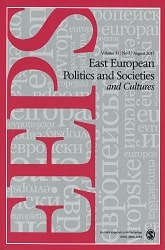Familiarity Breeds Contempt. Strategies of Economic Reform and Popular Attitudes toward the European Union in Lithuania and Estonia
Familiarity Breeds Contempt. Strategies of Economic Reform and Popular Attitudes toward the European Union in Lithuania and Estonia
Author(s): Aleksander LustSubject(s): Governance, Economic policy, International relations/trade, Economic development, EU-Accession / EU-DEvelopment
Published by: SAGE Publications Ltd
Keywords: European Union; development; dependency; Lithuania; Estonia;
Summary/Abstract: In referenda held in 2003, over 90% of Lithuanians supported joining the European Union (EU), while only two-thirds of Estonians did. Why? This article shows that Lithuanians and Estonians had different economic expectations about the EU. Most Lithuanians hoped that EU membership would help Lithuania overcome its economic backwardness and isolation. By contrast, many Estonians worried that the accession would reinforce Estonia’s underdevelopment and dependency on the West. I argue that these expectations reflected the two countries’ strategies of economic reform. Lithuania sold state-owned enterprises (SOEs) to their managers and continued to trade heavily with Russia, which slowed down the modernization of its economy. Estonia sold SOEs to foreigners and reoriented its trade rapidly from Russia to the West, which hurt its traditional sectors (particularly agriculture) and infrastructure.
Journal: East European Politics and Societies
- Issue Year: 23/2009
- Issue No: 03
- Page Range: 339-370
- Page Count: 32
- Language: English
- Content File-PDF

